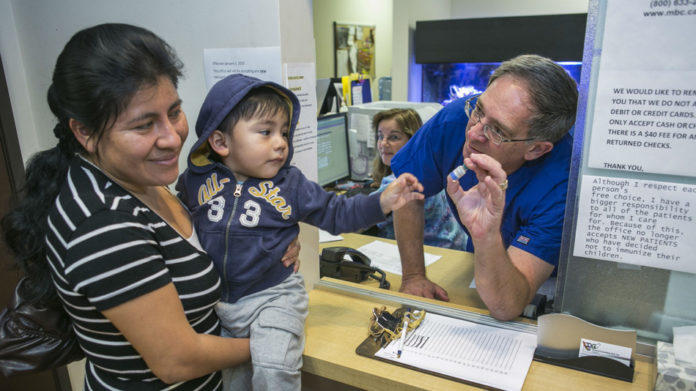Vaccine debate approaching fever pitch in midst of measles outbreak

New Jersey Governor and likely 2016 GOP presidential candidate Chris Christie made headlines Monday during a visit to the United Kingdom when — amid a measles outbreak in the United States — he said parents should have a “measure of choice” in deciding whether or not to vaccinate their children.
The measles outbreak began in December at California’s Disneyland and has begun to spread across the United States, reigniting a debate about vaccines.
Christie on Monday said that parents should have “a measure of choice” when it comes to vaccinations. “Not every vaccine is created equal and not every disease type is as great a public health threat as others.”
His comment quickly caused a backlash, with people across the political spectrum criticizing Christie’s comments.

New Jersey Gov. Chris Christie waves after speaking at the Freedom Summit, on Jan. 24, in Des Moines, Iowa.
Image: Charlie Neibergall/Associated Press
Among those who took issue with Christie’s position was GOP media strategist Rick Wilson.
Not dinging Christie because I have another dog in the 2016 fight. It’s because this statement is wildly irresponsible for a public figure.
— Rick Wilson (@TheRickWilson) February 2, 2015
After the backlash, Christie’s office issued a statement, saying that “the governor believes that vaccines are an important public health protection and with a disease like measles there’s no question kids should be vaccinated.”
Christie’s office did not respond to a request for further clarification.
Republican Sen. Rand Paul of Kentucky also weighed in later on Monday during a radio show hosted by conservative Laura Ingraham.
“I’m not anti-vaccine at all,” Paul said but added that “most of them ought to be voluntary.”
Paul’s comments, along with Christie’s original comments, came on the heels of those of President Barack Obama, who urged parents to get their children vaccinated in an interview with NBC, excerpts of which aired on Sunday and Monday.
“The science is, you know, pretty indisputable,” Obama said. “There is every reason to get vaccinated.”
The debate about vaccines has been going on for several years, sparked in part by a now-discredited 1998 paper by Andrew Wakefield, a former surgeon in Britain, who purported to show a link between vaccines and autism. Actress Jenny McCarthy further contributed to the controversy after her son was diagnosed with autism in 2005. McCarthy has helped lead an anti-vaccine movement, particularly in California.
Scientific research has shown no link between vaccines and autism.

In this May 14, 2014 photo, actress Jenny McCarthy attends “A Celebration of Barbara Walters ” in New York.
Image: Charles Sykes/Invision/Associated Press
Vaccination is often required for students to attend school, but parts of California have seen a rise in “personal belief” exemptions that allow kids to bypass the requirement. The beliefs of parents against vaccination often clash with the beliefs of a few parents whose children cannot be vaccinated due to weakened immune systems. One California father, whose child cannot yet be vaccinated due to leukemia, has asked the superintendent of his son’s school to force unvaccinated kids to stay home.
“We can expect to see many more cases of this vaccine-preventable disease unless people take precautionary measures,” Gil Chavez, the deputy director for the Center for Infectious Diseases at the California Department of Public Health, said during a Jan. 21 phone call with reporters. “It’s really a bad combination when you have people who trivialize what can be a serious illness, and then [spread] misinformation that vaccines can be unsafe.”
The number of measles cases in the U.S. have increased dramatically in recent years, according to the Centers for Disease Control and Prevention.
Last year, there were 644 cases but, if the current trend continues, 2015 will easily outpace that number. Already, at least 102 cases have been reported this year, 92% of which are associated with the outbreak that began in Disneyland, putting the total number of cases on track for more than 1,200 by the end of the year.

During the 10 years before a measles vaccine was invented in 1963, the highly contagious disease infected between 3 and 4 million Americans every year. Of those, between 400 and 500 people died annually, and another 4,000 developed brain swelling.
“We know that a disease that is apparently under control can suddenly return, because we have seen it happen,” the CDC says on its website. At least one recent outbreak of whooping cough — a disease also preventable by vaccine — began to spread among unvaccinated children in California in 2010.
If many in the U.S. stop vaccinating their children, the CDC website warns, “we could soon find ourselves battling epidemics of diseases we thought we had conquered decades ago.”
So far this year, measles has been detected in 14 states, including California, Arizona, Colorado, Illinois, Michigan, Minnesota, Nebraska, New York, Oregon, Pennsylvania, South Dakota, Texas, Utah and Washington. California alone has seen 58 confirmed cases linked to the Disneyland outbreak, according to the California Department of Public Health.
Have something to add to this story? Share it in the comments.
